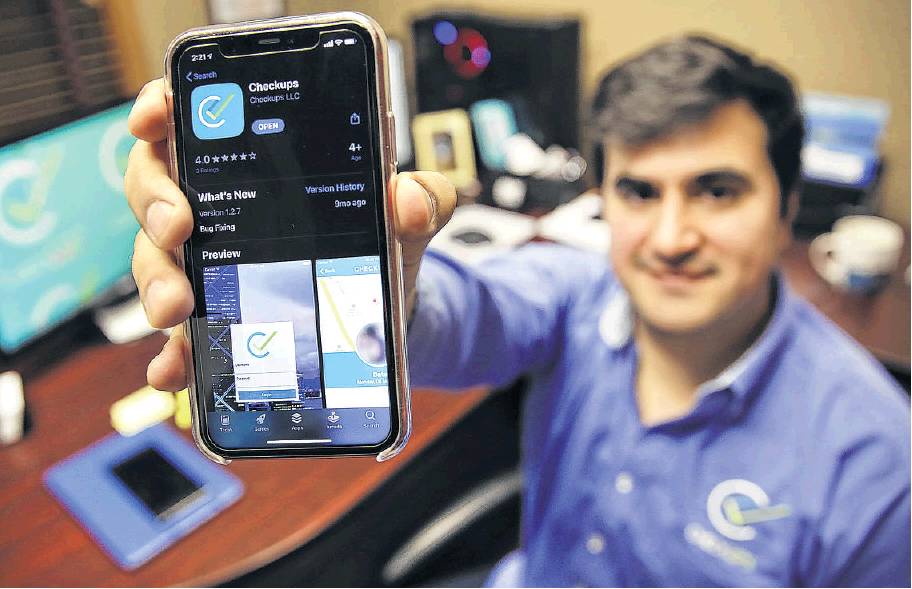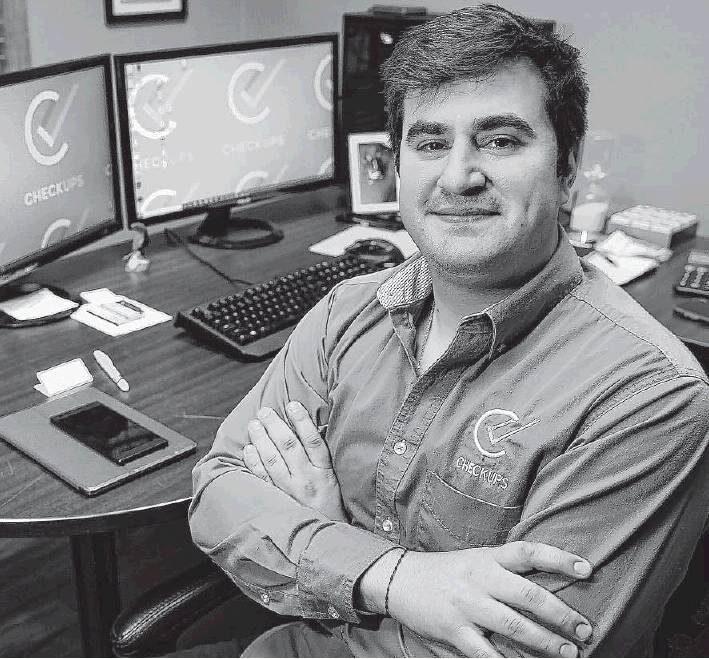Run-in with law leads to app to keep track of defendants
Checkups meant to ‘help everybody’ during the bail, probation process
By Diego Mendoza-Moyers STAFF WRITER
Enrique Pavlioglou, 29, is one of a rising number of homegrown tech entrepreneurs.
He launched his company, Checkups, in 2017 and participated in the six-week Geekdom program for startups earlier this year. He also recently won $20,000 from the Tech Fuel business pitch competition.
Pavlioglou developed the idea for his startup after being arrested nearly five years ago for doing something he was “not supposed to be doing,” as he explained to a panel of judges at Tech Fuel last month.
He was charged with obstructing a highway — a charge since expunged. He declined to discuss the incident in detail. He had to post bail, went through the judicial system and ultimately was placed on probation.
But during his time in the court system, Pavlioglou saw a way to improve the process for other probationers and people on bail.
Checkups offers a way for people on bail or probation to check in with their administrator — whether a bail bondsman or a probation officer — via their smartphone.
It works by opening the app, clicking a button and sending a selfie to the administrator. The photo is time-stamped and uses GPS to show precisely where it was taken. The administrator then accepts or denies the checkin based on the photo and information received.
The idea, Pavlioglou says, is to allow low-risk, often first-time offenders to easily let their bail bondsmen know they haven’t left town or to show their probation officer that they haven’t broken curfew or committed any other probation violations.
“I would sit in the lobby, and there would be 50 people there with me, and I was going to be there — for the probation every time I would check in — maybe three to four hours,” Pavlioglou said. “But I got lucky because I still had my license; I could just drive. There’s people that don’t have a license or maybe don’t have a car.”
Pavlioglou doesn’t have a background in software development or programming, and he turned to friends and local resources — such as Geekdom — to find out how he could build this idea into a successful business.
That he went from someone without business or technical expertise to someone who’s built a business around an application and has secured funding is “the embodiment of our mission in downtown San Antonio, and in San Antonio in general,” said Dax Moreno, the chief talent and recruitment officer for Tech Bloc, the advocacy group that organized the Tech Fuel competition.
“To me, this in actuality means we’re doing all the right things — that someone like (Pavlioglou) can get this idea and turn it into a prize-winning pitch that will allow him to build a real business and grow something right here in our own backyard,” Moreno said.
Shortly after beginning to develop Checkups in 2017, Pavlioglou left his job as a researcher at James Brehm and Associates, a local technology consulting firm he worked at before and after graduating from the University of Texas at San Antonio in 2016.
While primarily developed to help probationers and defendants, Checkups also potentially would reduce the caseload for county probation departments.
Jarvis Anderson, director of the Bexar County Community Supervisions and Corrections Department — which manages adult probation in the county — said Checkups offers little utility for most probationers in such a large county but has much more use early in the process.
Anderson said the county seeks to meet with offenders in person to work through various programs, which might include help with substance abuse or a DWI counseling program. And in a county as big as Bexar, which currently has 18,000 probationers reporting to officers, it could be difficult to remotely monitor thousands of people without any bugs or issues.
Anderson said each probation officer in Bexar County has a caseload of120 to125 people and meets with each of them at least once a month for around 15 to 30 minutes. Of those, 70 to 75 of the probationers are felons or higher-level offenders who come in more frequently.
“Typically, when we meet with clients, we really want to game plan and establish a rapport with them,” Anderson said. “The check-in aspect is just one minor component of what we do with probationers.”
But Anderson said he believes the app would be useful for pretrial situations. That could take one of two primary forms involving bail, the court-imposed fee that frees accused offenders from pretrial incarceration.
Accused offenders are issued a bail amount to ensure they will return to the court for the entire judicial process.
Someone who can’t afford bail can contact a bail bondsman, who will typically charge about 10 percent of the bond amount to bail the person out of jail. A bond agent would charge around $500 in an upfront payment for a defendant with a $5,000 court-issued bail amount, for example.
But if the defendant doesn’t show up for the court date, the bondsman has to pay the full bond amount — meaning the bondsman has an interest in knowing where the defendant is at all times.
“I thought it was horrible — my bail bondsman would call me randomly at 11 p.m. from a random phone number. … I owed them like $200, and for $200 you’re hounding me?” Pavlioglou said. “But keep in mind, I paid them $200 — they’re up $2,000. So if I don't show up to court, they lose $2,000. So I understand their need to do this because they’re risking the most.”
Pavlioglou has marketed Checkups to bail bondsmen as a subscription-style service that allows agents to easily check in with defendants and keep them informed about their court dates.
The app color-codes court dates — green means more they’re than a week from the current date, while yellow means the date is closer.
On the county side, someone out of jail on bail likely will have to check in regularly with a pretrial services officer who monitors defendants to ensure they’re following bail conditions, which could include stipulations such as a curfew restriction.
“Some counties (that use Checkups) tell clients, ‘We added your work address,’ so they’ll make them check in as soon as they get to work. If you have an AA meeting, check in as soon as you get to your AA meeting. Everything is geotagged, so they can see the picture was actually taken at an AA meeting,” Pavlioglou said.
“You also give (clients) the ability to say, ‘Hey, I was at my meetings.’ If you ever have to go see the judge, and the judge says, ‘Well, did you do everything you were supposed to?’ ‘Yes, your honor, you can see here, this picture was taken when I was at my meeting — this was when I had to take my drug test,’ ” he added. “That’s the basis of it — help everybody.”
Pavlioglou says larger counties are more difficult to work with, but his application is currently used in 14 smaller counties around Texas, including Bell County, where he first successfully marketed the application.
The ideal outcome, Pavlioglou says, is for some defendants and probationers to skip the hourslong waits to check in with county administrators each month. The app could also reduce the caseload for counties by allowing lowrisk offenders to check in remotely and allow the administrator more time to meet with clients who might require more attention or work.
For example, if an officer has to oversee checkups for 100 probationers or pretrial defendants, Pavlioglou’s application might work for something like 20 of the lowest-risk, first-time offenders in that group — potentially reducing the officer’s workload by around 20 percent. And for bail bondsmen, the application can assist in tracking clients.
Beyond the judicial system, Pavlioglou has experimented with Checkups for professions such as home health and construction. The application could allow managers to see what appointments a nurse is on and ensure employees are going to construction sites.
Pavlioglou is focused on improving Checkups, growing the services of his business and potentially hiring a customer service employee — for now, Checkups is a one-man show and Pavlioglou’s full-time job.
He said his revenue has fluctuated recently as he’s shifted focus to developing clients in the public sector and lost some of his bail bond agency clients.
Pavlioglou said he plans to use the money from Tech Fuel to travel for meetings with possible clients outside the area, as well as hire additional contract software developers.
Pavlioglou says he hopes to have 10 to 20 employees eventually and expand Checkups throughout Texas and the Southwest, streamlining the process on a large scale for low-risk offenders, and for counties and bond agents.
“I’m not trying to create a system where everyone just goes free and they go to random places and just check in with their phone,” Pavlioglou said.
“The whole idea is for you to have more responsibility, because right now the responsibility is on the officer — them waiting for you and them doing all the work. Now it’s on you — that’s the whole thing.” diego.mendoza-moyers@ express-news.net

